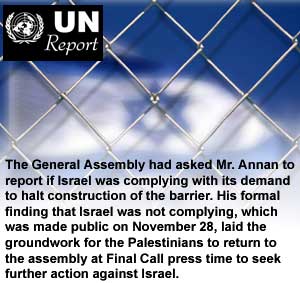
UNITED NATIONS (FinalCall.com) – One day after Israel vowed to speed up construction of its controversial West Bank security fence, United Nations Secretary-General Kofi Annan declared the building of the wall as “deeply counterproductive” at a time Israel and the Palestinians were being asked to follow the international “road map” peace plan.
In a cabinet meeting, Israeli Prime Minister Ariel Sharon explained what his response was to those who suggested that construction on the wall stop. “I hereby notify you that no condition shall be accepted É regarding the cessation of the fence, dismantling of the fence and other fabrications,” Mr. Sharon said, according to the newspaper Ad-Diyar, which is published in Beirut, Lebanon.
Palestinian President Yasser Arafat sent a message to the United Nations, General Assembly through his envoy Dr. Nasser al-Kidwa, that Israel’s insistence on building the barrier was “nurturing the seeds of malice and hatred and putting and end to the prospect of peace between the parties.”
In his report to the 191-nation UN General Assembly, Mr. Annan said the barrier, if completed as planned, would veer as much as 13 miles (22km) from Israel’s 1967 border with the West Bank. It would cut off 16.6 percent of West Bank land, which serves as home to 220,000 Palestinians in East Jerusalem and 17,000 in the rest of the West Bank,” the secretary-general’s 11-page report said.
The General Assembly had asked Mr. Annan to report if Israel was complying with its demand to halt construction of the barrier. His formal finding that Israel was not complying, which was made public on November 28, laid the groundwork for the Palestinians to return to the assembly at Final Call press time to seek further action against Israel.
Dr. al-Kidwa told reporters that the Palestinian delegation was returning to the General Assembly to push a resolution seeking an opinion from the International Court of Justice (ICJ) on whether the barriers were legal.
Fawzi Bin Abdul Majeed Shobokshi, a Saudi Arabian diplomat, said the “racist wall” created an even more difficult situation dismembering. Israel, he continued, claimed that, in building the racist wall, it sought to protect itself. “However, ulterior motives can be seen, such as the desire to seize water resources,” he argued.
A representative from Yemen, Abdullah M. Alsaidi said it was incomprehensible that Israel was defying the United Nations resolution 1515, calling for the building of the wall to stop. “Israel is feverishly working to complete a security fence that would allow it to further annex Palestinian lands, and Prime Minister Sharon claims he is willing to make some concessions,” Ambassador Alsaidi said. “Who could accept such twisted logic? How could the Palestinian people be asked to accept such twisted logic?” he asked.
However, it seems that some members of the European Union (EU) see the logic in questioning the legality of the security fence. At the end of a two-day EU-Mediterranean summit in the Italian city of Naples, France’s top diplomat Foreign Minister Dominique de Villepin said the EU had talked about bringing Israel’s separation wall to the International Court of Justice, according to Agence France-Presse in a Dec. 2 story.
Diplomats in the corridors of the UN say this is part of a EU effort to seize the initiative in shaping regional dynamics in the Middle East. Europe, observers say, is moving to build alliances with Middle East partners with which the U.S. cannot directly align, such as Iran and the Palestinians.
Ironically, Arab League Secretary-General Amr Mousa boycotted the Euro-Med summit, according to Beirut’s daily newspaper An-Nahar.
Mr. Mousa’s decision was to protest the position and statements by Italian Premier Berlusconi, because of his remarks in defense of Israel’s security barrier, the paper said.
But, an editorial in the Jerusalem Post claimed that Israeli officials were preparing for the attempt by the Palestinians to bring the resolution that the ICJ should decide the fate of the fence to the General Assembly. “Convening a special session of the assembly would be a “cynical use” of the world body and gives a “prize” to terrorism, an Israeli Foreign Ministry spokesman told the Jerusalem Post.
Arye Mekel, Israel’s deputy UN ambassador, said Israel would not dismantle the barrier, which he described as “an efficient and non-violent means of self-defense.”












